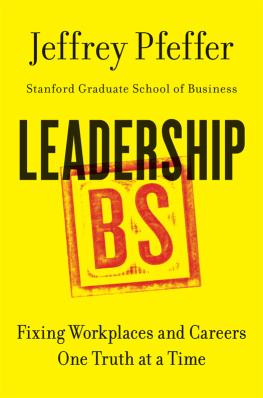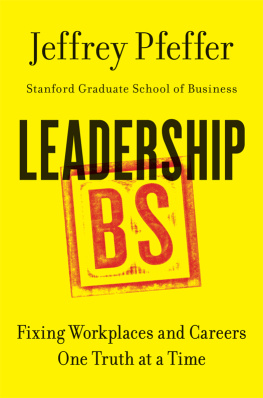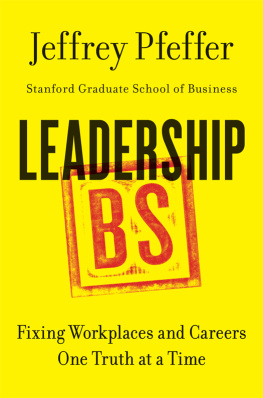Jeffrey Pfeffer - Power: Why Some People Have It - and Others Don’t
Here you can read online Jeffrey Pfeffer - Power: Why Some People Have It - and Others Don’t full text of the book (entire story) in english for free. Download pdf and epub, get meaning, cover and reviews about this ebook. City: Kennett Square, Pa., Norwood, Mass, year: 2011, publisher: Soundview Executive Book Summaries;HarperBusiness, genre: Politics. Description of the work, (preface) as well as reviews are available. Best literature library LitArk.com created for fans of good reading and offers a wide selection of genres:
Romance novel
Science fiction
Adventure
Detective
Science
History
Home and family
Prose
Art
Politics
Computer
Non-fiction
Religion
Business
Children
Humor
Choose a favorite category and find really read worthwhile books. Enjoy immersion in the world of imagination, feel the emotions of the characters or learn something new for yourself, make an fascinating discovery.
- Book:Power: Why Some People Have It - and Others Don’t
- Author:
- Publisher:Soundview Executive Book Summaries;HarperBusiness
- Genre:
- Year:2011
- City:Kennett Square, Pa., Norwood, Mass
- Rating:3 / 5
- Favourites:Add to favourites
- Your mark:
Power: Why Some People Have It - and Others Don’t: summary, description and annotation
We offer to read an annotation, description, summary or preface (depends on what the author of the book "Power: Why Some People Have It - and Others Don’t" wrote himself). If you haven't found the necessary information about the book — write in the comments, we will try to find it.
SUMMARY:
Although much has been written about how to make better decisions, a decision by itself changes nothing. The big problem facing managers and their organizations today is one of implementation--how to get things done in a timely and effective way. Stanford Business School Professor Jeffrey Pfeffer argues that problems of implementation are really issues of how to influence behavior, change the course of events, overcome resistance, and get people to do things they would not otherwise do. In a word, power. Managing with Power provides an in-depth look at the role of power and influence in organizations. Power is often disparaged, yet Pfeffer shows convincingly that its effective use is an essential component of strong leadership. With vivid examples from Lyndon Johnson and Henry Kissinger to John Sculley and Henry Ford, he makes a compelling case for the necessity of power in mobilizing the political support and resources to get things done in any organization. And he provides a fascinating look at the personal attributes--such as flexibility, stamina, and a high tolerance for conflict--and the structural factors--such as control of resources, access to information, and formal authority--that can help managers advance organizational goals and achieve individual success. Pfeffer begins his comprehensive evaluation of power by helping managers recognize situations that involve the use of power, and shows how to identify the principal actors and their likely points of view. He then looks at the different sources of power, and explains why some organizations and people use power more effectively than others. Next, he explores the specific strategies and tactics through which power and influence are used--how they help managers achieve tangible results. And finally, he considers issues of power dynamics: how power is lost, the role of power in the process of organizational change, and the positive and negative consequences of power for organizations. Politics and influence, the mechanisms by which power is realized, are unavoidable components of any business--indeed, any organization. Pfeffer shows that by understanding where power comes from and how it can be used effectively, managers can help their organizations, and themselves, achieve great things.
From Publishers Weekly
Pfeffer (The External Control of Organizations), professor of organizational behavior at Stanford University, posits that intelligence, performance, and likeability alone are not the key to moving up in an organization; instead, he asserts, self promotion, building relationships, cultivating a reputation for control and authority, and perfecting a powerful demeanor are vital drivers of advancement and success. The book has a realpolitik analysis of human behavior that isnt for everyone but its candor, crisp prose, and forthrightness are fresh and appealing. Case studies feature the careers of such leaders as G.E. CEO Jack Welch, General George Patton, Time CEO and Chairman Ann Moore, Lt. Colonel Oliver North, and President Bill Clinton; and Pfeffer dispenses advice on how to overcome obstacles like the self-promotion dilemma, how to sharpen ones acting skills on the job, and use tactics like interruption to appear more powerful. Brimming with frank, realistic insights on paths to the top, this book offers unexpected--and aggressive--directions on how to advance and flourish in an ever-more competitive workplace.
Copyright Reed Business Information, a division of Reed Elsevier Inc. All rights reserved.
Is the need for power an evil motivation driven by greed and lust, or is it a worthy goal that produces wealth, longevity, and leadership? Pfeffer asks us to consider the more positive reasons that we reach for power in our professional lives in order to feel in control, get wealthy, and achieve our goals. The desire for power is a topic that is often overlooked or disparaged in most inspirational leadership books because leaders presenting their own careers as models tend to portray themselves as noble and good, and omit discussing the power plays that they used to get to the top. According to Pfeffer, we need to stop seeing the world as a just and fair place, and actively develop those qualities needed to achieve power. He offers advice on how to obtain the initial position on the first rung of the ladder to power, how to take advantage of social networks, build a reputation, and overcome setbacks. Pfeffer never answers the question as to whether power leads to happiness, but he insists that having it will ultimately put you in a better place. --David Siegfried
Jeffrey Pfeffer: author's other books
Who wrote Power: Why Some People Have It - and Others Don’t? Find out the surname, the name of the author of the book and a list of all author's works by series.










